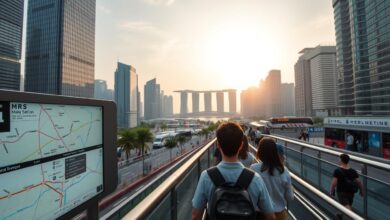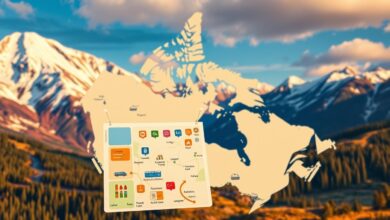Your Travel Checklist for the UK: Step-by-Step Planning for First-Time Visitors
Planning your first trip to the UK? A detailed travel checklist is key for a smooth journey.
Anúncios
This guide covers all the must-haves for a great trip. You’ll learn about important documents and often-forgotten details.
By preparing well, you can enjoy every part of your UK adventure. Don’t miss out on the fun!
Understanding UK Visa Requirements
Traveling to the UK means knowing about visa rules. This part will cover the different visas, the application process, and common errors to steer clear of.
You will be redirected to another website
Types of UK Visas
The UK has various visas for different reasons. Here are some main ones:
- Visitor Visa: For those visiting for fun, family, or brief business.
- Student Visa: For international students wanting to study in the UK.
- Work Visa: For people looking for jobs in the UK, including specific skills.
- Family Visa: For family members of UK citizens or residents to live in the UK.
Visa Application Process
The visa application process in the UK has several key steps. It’s crucial to check the UK travel documents checklist to make sure you have everything. The main steps are:
- Find the right visa based on your reason for travel.
- Fill out the online visa application form carefully.
- Get the needed documents, like financial info, letters, and ID.
- Pay the application fee and send in your application.
- Go to a visa appointment if needed, where they might take your biometric data.
Common Mistakes to Avoid
Many people face delays or get their visa applications rejected because of simple mistakes. To improve your chances, remember these tips:
- Make sure all forms are filled out right and sent in.
- Give accurate and full supporting documents.
- Check the visa type to avoid applying for the wrong one.
- Follow deadlines and any special rules for your country.
Booking Flights to the UK
Planning a trip to the UK starts with booking flights. A bit of research can save you money and make your trip better. You need to pick the right airport and know when to book your flight.
Choosing the Right Airport
The UK has many major airports, each with its own benefits. Heathrow is a big hub for international flights. Gatwick is great for those looking for cheaper options.
Choosing the right airport can affect your costs and how easy it is to get to your destination. It’s worth looking into what each airport offers, like amenities and transport.
Best Time to Book Flights
When you book your flights is very important. It’s best to book 2 to 3 months in advance for the best prices. Prices are lower during off-peak times, like late autumn and winter (except holidays).
Watching price trends can help you find the best time to book.
Tips for Finding Affordable Airfares
Getting affordable flights takes some planning. Here are some tips to help you find deals:
- Use comparison websites to compare prices and airlines.
- Be flexible with your travel dates. Changing your dates by a few days can save you money.
- Flights during the week are often cheaper than weekend flights.
- Sign up for fare alerts to know when prices drop.
Preparing for Accommodation
Finding the right place to stay is crucial for any trip to the UK. There are many options, each with its own benefits. It’s important to think about what you need and what you can afford.
Types of Accommodation in the UK
In the UK, you can find many types of places to stay. Here are a few:
- Hotels: Hotels range from fancy to affordable. They often have extras like room service and gyms.
- Hostels: Hostels are great for those on a tight budget. They offer shared spaces and a chance to meet others.
- Vacation Rentals: Websites like Airbnb let you stay in homes. This is perfect for families or those wanting privacy.
- Bed and Breakfasts: These offer a cozy feel and a morning meal. They give you a taste of local life.
Booking Platforms to Consider
There are many websites to help you find where to stay. Here are some popular ones:
- Booking.com: It has lots of options and is easy to use. You can filter by what you want.
- Airbnb: Airbnb is great for unique stays. It’s perfect for those wanting to experience local culture.
- Expedia: Expedia not only books places to stay. It also helps with booking flights and car rentals.
Important Factors to Keep in Mind
When picking where to stay, think about a few things:
- Location: Being close to sights, transport, and food is key to a good trip.
- Amenities: Look for things like Wi-Fi, parking, and breakfast. They make your stay better.
- Budget: Knowing your budget helps you choose. It makes planning easier.
Creating an Itinerary
Planning a trip to the UK means making a plan that fits your interests. A good plan lets you see the best spots and cultural highlights. It makes your visit more enjoyable.
Popular Destinations to Include
When making your itinerary, don’t forget to include:
- London – Famous for attractions like the Tower of London, Buckingham Palace, and the London Eye.
- Edinburgh – Known for its historic castle and the annual Edinburgh Festival.
- Bath – Renowned for its Roman baths and stunning Georgian architecture.
Cultural Experiences Not to Miss
Adding cultural experiences makes your trip richer. Some key items for your UK trip include:
- A booking for the British Museum to admire its extensive collection of world art.
- A tour of the Scottish Highlands for breathtaking landscapes and rich history.
- Engagement with local theater performances in London’s West End.
Balancing Sightseeing and Relaxation
It’s important to balance seeing sights with downtime. Taking breaks lets you recharge and enjoy your trip more. Try visiting local parks or having afternoon tea to relax. A good plan includes both excitement and calm, making your trip better.
Packing Essentials for a UK Trip
Planning a trip to the UK means thinking about what to pack. The weather can change quickly, so it’s key to bring clothes that can be layered. You’ll also want to bring accessories and dress in a way that shows respect for local customs.
Clothing for Varying Weather
The UK’s weather is always changing. It’s smart to pack clothes that can be layered. This way, you can adjust your outfit as the weather changes. Here are some clothes you might want to consider:
- Water-resistant jacket
- Warm sweaters or fleeces
- Comfortable walking shoes
- Umbrella or a compact raincoat
- Lightweight layers for warmer days
Necessary Travel Accessories
There’s more to packing than just clothes. You’ll also need the right accessories for a smooth trip. Here are some essentials:
- Universal power adapter
- Portable charger for devices
- Travel-sized toiletries
- Travel pillow for long flights
- Ziplock bags for organizing
Adapting to Local Customs
Knowing local customs can make your trip better. Dressing respectfully is important, especially when visiting churches or cultural sites. Wearing smart-casual clothes helps you fit in. Here are a few tips for dressing right:
- Avoid overly casual attire in finer establishments
- Be mindful of dress codes during events
- Choose neutral colors for public outings
Understanding the UK Currency
The UK uses the pound sterling, marked by the symbol £. Knowing how to manage money while traveling is key. It helps make your trip better. It’s important to plan your budget well, as different ways to pay can change your costs.
Using safety tips for UK travel can also help with money matters. This ensures a smooth financial experience during your journey.
Exchanging Currency
Exchanging money well helps you deal with expenses easily. You can exchange currency at banks, airports, and special offices. While airport rates are handy, they usually give you less value for your money.
It’s wise to exchange a bit of money before you go. This helps cover immediate costs like getting to your accommodation.
Using Credit Cards vs. Cash
Credit cards and cash both have their benefits in the UK. Credit cards are convenient and often give better rates, but not all places take them. Cash is better for small buys, tips, and places that don’t accept cards.
Make sure to tell your bank you’re traveling. This prevents your card from being blocked for suspicious activity.
Tipping Practices in the UK
Tipping in the UK is different from other places. It’s important to know the local customs. Here are some tips:
- Restaurants: A 10-15% tip is standard if there’s no service charge.
- Bars: Tipping isn’t required, but rounding up the bill is nice.
- Taxis: A 10% tip is enough, especially for excellent service.
Navigating Public Transportation
The UK has a wide public transport network that’s key for travelers. Knowing how to use it can make your trip better. From buses to trains and the famous London Underground, using public transport is a great way to see the country. Here are some top tips for using public transport in the UK.
Understanding UK Transport Systems
The UK’s public transport system is big and has many choices. Big cities have good bus networks, and trains connect places well. London is special with its Underground, or Tube, which gets you around fast.
- Bus services run often in cities, covering almost every area.
- Trains connect big cities and offer beautiful views of the countryside.
- In London, the Tube is the fastest way to get around, avoiding traffic.
Tips for Using the London Underground
Using the Tube for the first time can seem hard, but a few tips can help. Knowing how to buy tickets and using apps makes traveling easier and faster.
- Get an Oyster card for cheaper travel; it’s easy to use.
- Use transport apps to find routes and check service updates.
- Check train schedules, as some lines might have weekend work.
Alternative Transportation Options
There are also other ways to travel in the UK. Ride-sharing and bike rentals are becoming more popular, offering flexible travel options.
- Ride-sharing apps like Uber work in many cities, making travel easy.
- Biking is fun to explore cities; many places have bike share programs.
- Walking is a great way to see local culture and attractions.
Communication and Mobile Connectivity
Staying connected while traveling in the UK is key. There are many ways to stay in touch without spending too much. Knowing these options is a must for any trip.
SIM Card Options for Travelers
Getting a local SIM card is a smart move. It lets you use data and make calls without breaking the bank. Many providers offer deals for tourists.
| Provider | Data Packages | Pay-As-You-Go Option | Validity |
|---|---|---|---|
| Three | Up to 12 GB | Yes | 30 days |
| EE | Up to 20 GB | Yes | 30 days |
| Vodafone | Up to 8 GB | Yes | 30 days |
Keeping Connected Without Roaming Fees
To dodge high roaming costs, use free Wi-Fi. Cafes, restaurants, and public transport often offer it. This way, you stay connected without extra charges.
Also, download maps and use messaging apps. They help avoid unwanted charges.
Language Considerations
English is the main language in the UK, but there are local dialects. You might hear different ways of speaking and slang. Knowing a few key phrases can make your trip better.
Health and Safety Considerations
When traveling to the UK, health and safety are key. Knowing UK travel safety tips can make your trip better. Getting travel insurance is crucial to protect against unexpected costs or trip changes.
Travel Insurance Importance
Travel insurance covers many risks, like trip cancellations and medical emergencies. Many people don’t realize how important it is. Healthcare in the UK can be pricey for non-residents. It’s smart to compare insurance options to find the best fit.
Common Health Precautions
Before your trip, talk to a doctor about vaccinations or health alerts for the UK. Keeping up with routine shots is important. Also, carrying basic first-aid items is helpful. Remember to wash your hands often to avoid getting sick.
Emergency Contacts and Resources
Knowing emergency numbers is crucial. In the UK, dial 999 for police, fire, and ambulance. Also, find nearby hospitals and clinics. The NHS website has lots of info on finding medical help if you need it.
Exploring UK Culture and Etiquette
Traveling to the UK means understanding its culture and etiquette. Knowing these helps you have a respectful and enriching visit. It’s key to learn about cultural norms, dining manners, and important customs.
Key Cultural Norms
Travelers should know a few important cultural norms in the UK. Politeness and queueing are big ones. People say “please” and “thank you” a lot, showing respect. Not following the queue can upset locals.
Learning these social habits helps you interact well during your visit.
Dining Etiquette in the UK
Dining out in the UK has its own rules. Table manners are very important. You should stay seated until everyone has their food.
Use your fork in your left hand and knife in your right. Tipping is common, around 10% to 15% of the bill. Knowing these rules is a must for a good dining experience.
Important Customs to Be Aware Of
Knowing important customs makes your trip better. Greetings are firm handshakes and eye contact. Talking about the weather is a great way to start a conversation.
Being polite is key in all interactions. Understanding these customs helps you enjoy the local culture. It’s important to embrace these practices for a memorable visit.
Having Fun: Entertainment Options
Exploring the UK is full of fun activities. You can enjoy vibrant festivals that celebrate culture and traditions. There are also museums and art galleries with amazing collections.
Outdoor activities offer adventure in beautiful landscapes. These experiences are key things to do before you travel to the UK.
Popular UK Festivals and Events
The UK’s festival scene is lively, with music and food events. The Notting Hill Carnival fills streets with color and sound in August. The Edinburgh Festival Fringe brings theatrical performances every summer.
Attending these events lets you dive into local culture. It’s a great way to celebrate with the locals.
Museums and Art Galleries to Visit
Art lovers will find plenty in the UK. The British Museum has historical artifacts. The Tate Modern showcases contemporary art.
These places are must-sees for a cultural trip. They offer a deep dive into the UK’s art and history.
Outdoor Activities for Adventure Seekers
Adventure seekers will love the UK’s outdoors. Hiking in the Lake District offers stunning views. Coastal paths provide breathtaking seaside views.
There’s a wide range of activities, from cycling to rock climbing. These invite thrill-seekers to explore the country’s beauty.
Preparing for Returning Home
As your trip to the UK ends, getting ready for the return home is key. Knowing customs rules helps make the transition smooth. It’s important to understand the rules on duty-free items and how to declare goods when leaving.
Unused currency can be tricky. You have a few choices for leftover money from your UK visit. You can exchange it, save it for later, or spend it on gifts before you go. Finding the best exchange rate is a good idea to get the most value.
Looking back on your UK trip helps you appreciate the memories made. Every experience, from trying local food to visiting historical sites, shows you British culture. Reflecting on your trip also helps you make a better checklist for future travels.
FAQ
What documents do I need for traveling to the UK?
You’ll need a valid passport. Some nationalities might also need a visa. Check the UK government’s website for visa details based on your visit’s purpose.
What are the essential items to pack for a trip to the UK?
Pack clothes for different weather, an umbrella, travel adapters, toiletries, and your travel documents. A UK travel packing list can help you remember everything.
How can I stay safe while traveling in the UK?
Keep your belongings safe, be aware of your surroundings, and know emergency numbers. Learning about UK travel safety tips can make your trip safer.
When is the best time to visit the UK?
The best time depends on what you want to do. Spring and autumn have nice weather and fewer people. Summer is busier. A UK trip planner can help you plan the best time.
How do I get around the UK using public transport?
The UK has a big public transport system. You can use trains, buses, and the London Underground. Knowing how to use these can help first-time visitors.
What are some must-do cultural experiences in the UK?
Don’t miss historical sites, museums, and local festivals. Try afternoon tea or a West End show for a memorable experience.
Do I need travel insurance when visiting the UK?
Yes, travel insurance is a good idea. It covers unexpected things like health issues or lost items, so you can relax during your trip.
What is the local currency and how should I manage my money?
The UK uses the pound sterling. You can exchange money before or after arriving. Use credit cards for big purchases and learn about UK tipping.
Are there any specific customs I should be aware of?
The UK values queueing and polite talk. Knowing these customs can make your visit more respectful.
How can I keep connected while traveling in the UK?
Buy a local SIM card or use Wi-Fi to avoid high roaming costs. Knowing how to stay connected can be helpful.
Published on: 12 de April de 2025

Arturo González
Arturo González is the founder and lead writer of DebxCred.com, a platform created to help people make smarter and more informed financial decisions. With a degree in Business Administration and a specialization in Financial Marketing, Arturo built a solid corporate background before deciding to share his knowledge in a practical, easy-to-understand way.
Driven by a genuine passion for finance and education, Arturo turned DebxCred.com into a trusted source for detailed reviews of financial products, digital banking tools, and practical financial education — empowering readers to take control of their money with confidence.
In his free time, Arturo finds balance and inspiration while surfing — a hobby that reflects his calm yet determined approach to helping others build a healthier and more prosperous financial life.






